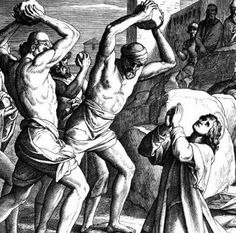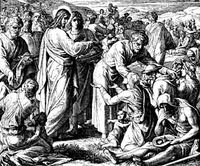Stoning: Difference between revisions
m (→Living Stones?) |
|||
| Line 10: | Line 10: | ||
Taking someone to court before a “council” of men or [[Jury|jury]] of your peers made up of "Living [[Stones]]" was a way of deciding ''Fact and Law''. It was a way a free society could tend to ''"the [[weightier matters]] of law, judgment, mercy, and [[faith]]"''.<Ref>Matthew 23:23 Woe unto you, scribes and Pharisees, hypocrites! for ye pay tithe of mint and anise and cummin, and have omitted the weightier [matters] of the law, judgment, mercy, and faith: these ought ye to have done, and not to leave the other undone.</Ref> | Taking someone to court before a “council” of men or [[Jury|jury]] of your peers made up of "Living [[Stones]]" was a way of deciding ''Fact and Law''. It was a way a free society could tend to ''"the [[weightier matters]] of law, judgment, mercy, and [[faith]]"''.<Ref>Matthew 23:23 Woe unto you, scribes and Pharisees, hypocrites! for ye pay tithe of mint and anise and cummin, and have omitted the weightier [matters] of the law, judgment, mercy, and faith: these ought ye to have done, and not to leave the other undone.</Ref> | ||
There has been a concerted effort through [[Sophistry]] to keep people from understanding that the [[Altars]] of [[Clay and Stone]] were social structures to help keep people free in a [[world]] determined to | There has been a concerted effort through [[Sophistry]] to keep people from understanding that the [[Altars]] of [[Clay and Stone]] were actually social structures to help keep people free in a [[world]] that seems determined to subjugate people around them, if not robbing or destroying them altogether. | ||
[[Stoning]] someone was originally a metaphor in a society that would not allow or support people who undermined [[Social Virtues|social virtues]] with [[sloth]] or neglect. If people within society were conducting themselves in a way that did not strengthen them or society there was a way of taking them before a court of their peers who would | [[Stoning]] someone was originally a metaphor in a society that would not allow or support people who undermined [[Social Virtues|social virtues]] with [[sloth]] or neglect. If people within society were conducting themselves in a way that did not strengthen them or the society itself, there was a way of taking them before a court of their peers who would in turn notify the Living Stones of their charitable altars. This way the weak or lazy of the society would receive no more social [[benefits]]. The verdict was not about beating people to death with rocks but withdrawing support and shunning them within the imaginary walls of society or the banishment of an individual to live outside the gates of that [[community]] or social [[communion]]. It was a form of excommunication, by being evicted from the community and the righteous [[Welfare|welfare]] system of God. | ||
Those social [[benefits]] were a privilege, not a right. The people in this early form of a [[Republic]] had that right to publicly challenge the [[slothful]] and immoral behavior without violating any natural right. Since their [[Corban|offerings]] to the [[Levites]] who performed the religious duties of society were [[freewill offerings]] the people individually held the [[One purse|purse string]] of the government. Their contributions to society remained [[Tithing In Conscience]] and they remained free. | Those social [[benefits]] were a privilege, not a right. The people in this early form of a [[Republic]] had that right to publicly challenge the [[slothful]] and immoral behavior without violating any natural right. Since their [[Corban|offerings]] to the [[Levites]] who performed the religious duties of society were [[freewill offerings]] the people individually held the [[One purse|purse string]] of the government. Their contributions to society remained [[Tithing In Conscience]] and they remained free. | ||
Revision as of 09:34, 14 March 2017

Living Stones?
The Altars of Abraham and Moses were stones fit together without hewing those stones. Were those altars dead or living stones?
If they were living stones what did it mean to stone someone at the gates or against a wall in the city?
"The Hebrew word rigmah [רִגְמַת] is translated into “council”, but actually means literally “a gathering of stones”. It is from the Hebrew word Regem [רֶ֫גֶם], which is translated “friend” and is the same as ragam [רָגַם], meaning “stone”. Both words have as a common origin [רֶגֶב] regeb, “a clod” (of earth). Hebrew letters have meanings which define the words."[1]
Taking someone to court before a “council” of men or jury of your peers made up of "Living Stones" was a way of deciding Fact and Law. It was a way a free society could tend to "the weightier matters of law, judgment, mercy, and faith".[2]
There has been a concerted effort through Sophistry to keep people from understanding that the Altars of Clay and Stone were actually social structures to help keep people free in a world that seems determined to subjugate people around them, if not robbing or destroying them altogether.
Stoning someone was originally a metaphor in a society that would not allow or support people who undermined social virtues with sloth or neglect. If people within society were conducting themselves in a way that did not strengthen them or the society itself, there was a way of taking them before a court of their peers who would in turn notify the Living Stones of their charitable altars. This way the weak or lazy of the society would receive no more social benefits. The verdict was not about beating people to death with rocks but withdrawing support and shunning them within the imaginary walls of society or the banishment of an individual to live outside the gates of that community or social communion. It was a form of excommunication, by being evicted from the community and the righteous welfare system of God.
Those social benefits were a privilege, not a right. The people in this early form of a Republic had that right to publicly challenge the slothful and immoral behavior without violating any natural right. Since their offerings to the Levites who performed the religious duties of society were freewill offerings the people individually held the purse string of the government. Their contributions to society remained Tithing In Conscience and they remained free.
Moses had originally bound the people together not by Contracts, Covenants or Constitutions but by mutual love[3] and aid but when they decided to reject God in 1 Samuel 8 and elect a leader who could exercise authority one over the other the society began to seek ways to justify biting one another.
Stoning did not originally mean to pick up rocks and throw them at someone to murder them. "Thou Shalt Not Kill" and not oppressing the stranger and giving drink to the enemy were all a part of the Old Testament.
Israel took care of the needy through the freewill offerings of Corban without the Covetous Practices of the modern Benefactors of the welfare state which has been a snare that has cursed children with debt and bondage and made men Merchandise as surety for that debt .
To be banished from a community could be a death sentence. It certainly would be throwing you to the dogs of societies all around you where you would be forced to labor under the rulers of the rest of the world.
Israel originally operated by the perfect law of liberty with freewill offerings but the charity which flowed through the ministers or Levites of that church in the wilderness needed to flow freely from the moral members of society to the moral and virtuous members of that society.
Their sacrifices, even those of the Red Heifer had a purpose and value among the virtuous people of societies. While there was no shame in being poor there was no virtue in poverty. If people were to be helped they needed to meet a moral criteria of righteous behavior or go somewhere else. That left few options that did not include bondage under a master other than God the father.

The early Church actually operated much like early Israel in the tradition of a Pure Republic by way of Pure Religion. This infuriated the Pharisees who peddled the Baptism of Herod which followed the socialist's agenda of the new deal of Rome and its imperial cult.
Pharisees
Studying the Christian conflict, which has been recorded in Roman history, will show that the Modern Christians are the new Pharisees.
If Modern Christians have truly repented and believed Christ then:

The church lost "the way" when it abandoned the practice of "pure Religion" while claiming to be the Church established by Christ. The people developed an appetite for the "wages of unrighteousness" from "public religion" in the days of Constantine. Those new Christians that often failed to fully repent degenerated the moral character of society with the masses of "instant christians".
That new religion of the emperor introduced a new faith with his apostate church replacing the doctrine of Jesus with the "doctrines of men", the Holy Spirit with emotion, the truth with the speaking of "great swelling words, having men's persons in admiration because of advantage."[4]
They had a form of godliness but denied the power thereof.
Where is your religion
- Where do you find the Daily ministration of the early Church, the Pure Religion of James and the Corban of Jesus?
- Are you following The Blessed Strategy of Christ like the Early Christians?
- Are you following The Way through Love of one another or the way of the world and the Fathers of the earth?
- Do you seek the benefits of bankrupt nations, or do you forgive and seek the benefits of Christ's appointed Kingdom?
- Do you only gather for the comfort it gives you, or do you gather to benefit others?
- Christ came to serve, not be served. Do you desire to be served, or are you coming in His name and according to His character to serve others?
If we desire His Grace but we only love those who love us, then there is no Grace because it is clear we do not really believe in Him.
If we do not Repent of our Covetous Practices and are not diligently gathering together in Free Assemblies of Love for all to provide for one another in Charity according to the Perfect law of liberty then we have nothing according to Paul. According to Luke 6:32 if we only love those who love us there is no "Grace". Christ also said if you do not Forgive neither will the Father forgive you.[5]
It is not enough to hate the deeds of the workers of iniquity, but we must return to Thy first love and thy first work. To break the yoke, we need to return to the ways of righteousness spoken of in Isaiah 58 which are the ways of Christ and the early Church. And His yoke is light for it is carried by our love of one another.
Abraham, Moses, John the Baptist and Christ all created Networks of charity to care for the true needy of society without force which is how they were able to help set people free. Do you gather with His Church to attend to the Weightier matters as Christ said?
- Are you gathering in a Network of righteousness?
- Do you come to love others or just be loved?
- Are your Congregations' gatherings fruitful enough so that no one has to pray to Benefactors who exercise authority one over the other?
- Does anyone in your Free Assemblies have to apply to the Fathers of the earth, or seek their many benefits?
Early Christians found themselves in conflict with these systems of social welfare because they made the word of God to none effect. Christians had repented of their covetous nature when they received the Baptism of Christ. They heard and became Doers of the word not hearers only.
Remember Proverbs 12:24, "The hand of the diligent shall bear rule: but the Slothful shall be under Tribute."
We know that liberty under God is not for the covetous who are Biting one another but it is also not for the slothful. If we are not congregating together in free assemblies bound together in a broad network by faith, hope, and charity alone according to the perfect law of liberty then we are not truly seeking the Kingdom of God nor His righteousness.
Sacrifice
Altars
Stones |
Clay and Stone |
Stones upon |
White stones |
Lively Stones of a Living Altar |
Sophistry |
Leaven |
Breeches |
Stoning |
Altars |
Church legally defined | Sacrifice of fools
Graven images |
Red Heifer | Reserve fund
Corban |
Tithing In Conscience |
Self-Sacrifice |
Pure Religion |
Legal charity |
Public religion |
Worship |
Welfare |
Welfare types |
Daily ministration
Christian conflict |
Benefactors |
Feasts |
Good Samaritan |
Thy first love |
Born again |
New creature
Celebrate |
Temples |
Modern Christians |
The Blessed Strategy
Power To Change |
Peine forte et dure |
Tithing |
Offering |
Korban
Korab |
Minchah
Necek |
Nedabah
Shelem |
Tenuwphah
Teruwmah
Charity |
Freewill offerings |
Corban
Religion |
Pure Religion |
Golden rule |
Altars |
Tens |
Network |
Pentecost
Perspective |
One purse |
Temptations |
Tithe |
Tithing |
Tithing In Conscience |
Tithingman |
Tribute |
Taxation |
Treasury |
Corban |
Charitable Practices |
Covetous Practices |
Fervent Charity |
Gleaners |
FEMA |
Lady Godiva |
If you need help:
- Or want to help others:
Join The Living Network of The Companies of Ten
The Living Network |
Join Local group |
About |
Purpose |
Guidelines |
Network Removal
Contact Minister |
Fractal Network |
Audacity of Hope |
Network Links
Footnotes
- ↑ From Section 2 of Chapter 3 Moses and the Altars of Clay and Stone of the book Thy Kingdom Comes
- ↑ Matthew 23:23 Woe unto you, scribes and Pharisees, hypocrites! for ye pay tithe of mint and anise and cummin, and have omitted the weightier [matters] of the law, judgment, mercy, and faith: these ought ye to have done, and not to leave the other undone.
- ↑ Leviticus 19:18 Thou shalt not avenge, nor bear any grudge against the children of thy people, but thou shalt love thy neighbour as thyself: I am the LORD.
Matthew 5:43 Ye have heard that it hath been said, Thou shalt love thy neighbour, and hate thine enemy.
Matthew 19:19 Honour thy father and thy mother: and, Thou shalt love thy neighbour as thyself.
Matthew 22:39 And the second is like unto it, Thou shalt love thy neighbour as thyself.
Mark 12:31 And the second is like, namely this, Thou shalt love thy neighbour as thyself. There is none other commandment greater than these.
Romans 13:9 For this, Thou shalt not commit adultery, Thou shalt not kill, Thou shalt not steal, Thou shalt not bear false witness, Thou shalt not covet; and if there be any other commandment, it is briefly comprehended in this saying, namely, Thou shalt love thy neighbour as thyself.
Galatians 5:14 For all the law is fulfilled in one word, even in this; Thou shalt love thy neighbour as thyself.
James 2:8 If ye fulfil the royal law according to the scripture, Thou shalt love thy neighbour as thyself, ye do well: - ↑ 5622 ὠφέλεια opheleia [o-fel’-i-ah] from a derivative of the base of 5624 profitable; n f; AV-profit 1, advantage 1; 2
- 1) usefulness, advantage, profit
- ↑ Matthew 6:15 But if ye forgive not men their trespasses, neither will your Father forgive your trespasses.
Mark 11:26 But if ye do not forgive, neither will your Father which is in heaven forgive your trespasses.
About the author
Subscribe
HELP US at His Holy Church spread the word by SUBSCRIBING to many of our CHANNELS and the Network.
The more subscribers will give us more opportunity to reach out to others and build the network as Christ commanded.
Join the network.
Most important is to become a part of the Living Network which is not dependent upon the internet but seeks to form The bands of a free society.
You can do this by joining the local email group on the network and helping one another in a network of Tens.
His Holy Church - YouTube
https://www.youtube.com/user/hisholychurch
Bitchute channel will often include material that would be censored.
https://www.bitchute.com/channel/o6xa17ZTh2KG/
Rumble Channel gregory144
https://rumble.com/user/gregory144
To read more go to "His Holy Church" (HHC) https://www.hisholychurch.org/
Brother Gregory in the wilderness.
https://www.youtube.com/channel/UCJSw6O7_-vA4dweVpMPEXRA
About the author, Brother Gregory
https://hisholychurch.org/author.php
PreparingU - YouTube
https://www.youtube.com/channel/UC9hTUK8R89ElcXVgUjWoOXQ
Facebook
https://www.facebook.com/HisHolyChurch
See more Forbidden Definitions
